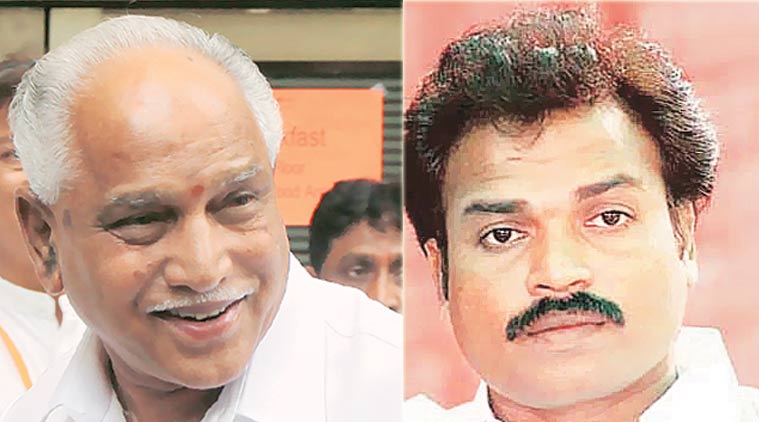Karnataka: When two splinter groups denied BJP a hung verdict
Had the splinter groups not taken away BJP votes, the pooling together of their votes suggests, the BJP could have won 90 seats and reduced the Congress to 94.
 B S Yeddyurappa (L), B Sriramulu
B S Yeddyurappa (L), B Sriramulu
The Congress heads into the May 12 Karnataka Assembly elections defending 122 seats it had won in 2013, thrice as many as the BJP’s 40. The contest would not have been so uneven, however, had the BJP not suffered two splits ahead of the elections. From a count of the seat-wise votes polled by the BJP and its two splinter parties — B S Yeddyurappa’s Karnataka Janata Paksha (KJP) and B Sriramulu’s BSR Congress Party (BSRCP) — it emerges that the three together would have run the Congress close.
Had the splinter groups not taken away BJP votes, the pooling together of their votes suggests, the BJP could have won 90 seats and reduced the Congress to 94. The JD(S), which won 40 seats, would have come down to 35. The remaining five seats would have gone to independents.
 The projection of 94 seats going to an undivided BJP in 2013, against 90 to the Congress, suggests not only that the contest would have been neck and neck, but also that the verdict would have been hung rather than a comfortable Congress majority.
The projection of 94 seats going to an undivided BJP in 2013, against 90 to the Congress, suggests not only that the contest would have been neck and neck, but also that the verdict would have been hung rather than a comfortable Congress majority.
With the Congress nearly 20 seats short of a majority, that would have made the JD(S) a potential kingmaker with its 35 seats, even though the tally would have been smaller than the 40 it actually won.
The KJP, incidentally, won only six seats in 2013, and the BSRCP four. Contesting separately, the BJP, the KJP and the BSRCP added up to only 50 seats, way short of the theoretical 90 from the pooling of votes.
While the Congress polled 36.59% of the votes in 2013, the BJP polled 19.89%. Pooling the BJP vote share with those of the KJP (9.79%) and BSRCP (2.69%), the three could have combined to 32.37%, about 4 percentage points behind the Congress vote share.
The projected difference of only four seats, in spite of the four-point difference in vote shares, is largely explained by the region-wise distribution of votes. Although the two BJP splinters together polled only about 12.5% across the state, their votes were primarily concentrated in two regions —central Karnataka and Hyderabad Karnataka. Here, their pooled vote share was 20.4% (central Karnataka) and 23.9% (Hyderabad Karnataka). These two regions account for over 60 Assembly seats.
Conscious of the cost that it paid for the splintering of votes, the BJP wooed both Yeddyurappa and Sriramulu back into the party fold ahead of the 2014 Lok Sabha elections. The importance of the two splinter groups showed in the Lok Sabha results. From having won 40 Assembly seats in 2013, the BJP went on to lead in 132 Assembly segments the following year. The Congress, which had won 122 seats in 2013, could lead only 77 segments in 2014. In terms of Lok Sabha seats, the BJP won 17 and the Congress 9, out of 28.
With a united BJP again challenging the Congress in the upcoming Assembly elections, the ruling party is making its own effort to blunt the challenge by pressing for minority religion status for Lingayats, an effort to address the community to which the BJP’s CM candidate Yeddyurappa belongs.































